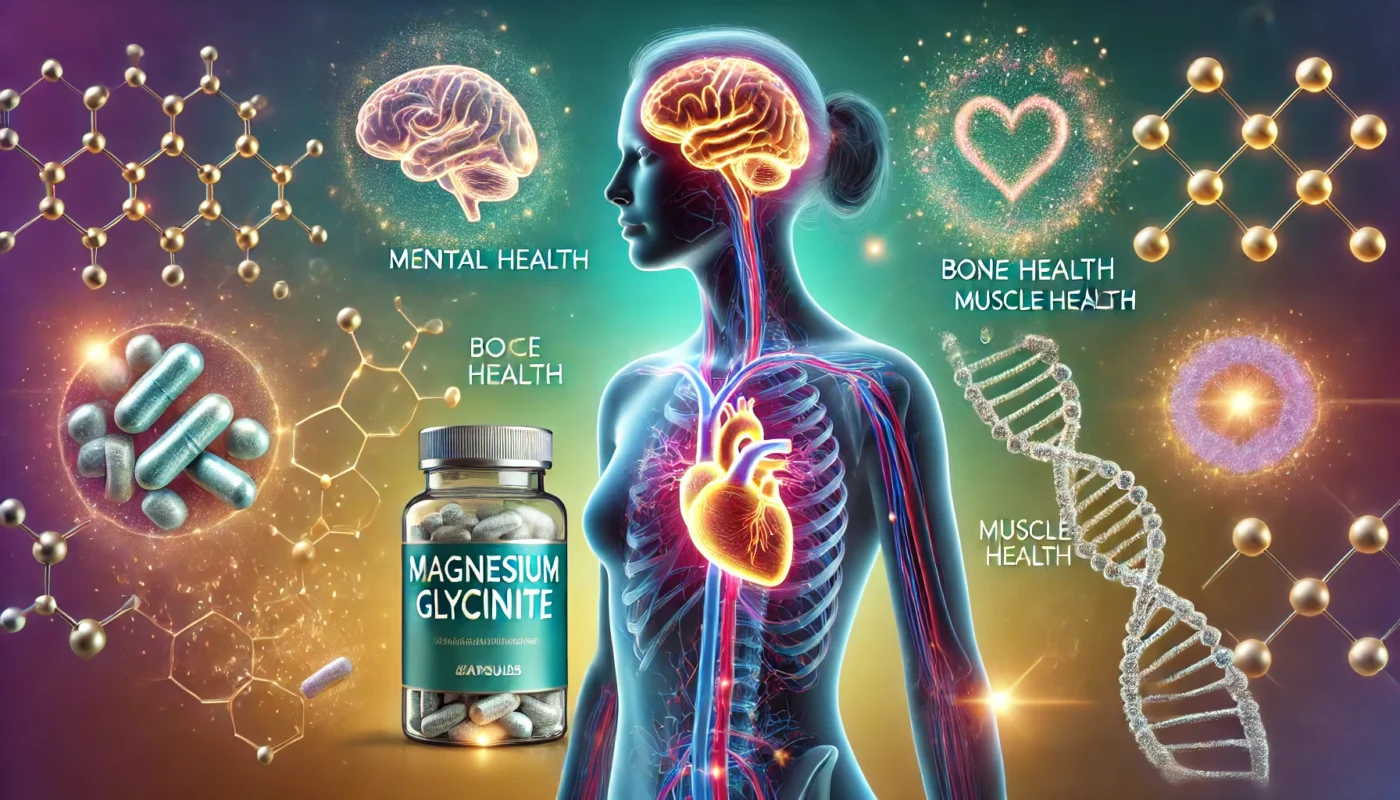Menopause marks a significant transition in a woman’s life, bringing hormonal changes that can affect everything from bone density to mental health. As estrogen levels decline, women are at an increased risk for osteoporosis, cardiovascular disease, and mood disorders such as anxiety and depression. While lifestyle adjustments and dietary changes are essential, magnesium glycinate has emerged as a potent supplement to support post-menopausal health. Known for its high bioavailability and calming properties, magnesium glycinate offers a wide range of benefits for bone health, mental well-being, and overall vitality in aging women.
You May Also Like:
Healthy Aging for Men with Magnesium Glycinate: What You Should Know
Magnesium Glycinate for Resilient Aging: Preserving Muscle and Bone Strength
Magnesium Glycinate and Healthy Aging in Women: Post-Menopause Support is an original (HSLHealing) artcile.
Understanding Post-Menopause and Its Challenges
Post-menopause is the stage of a woman’s life that begins 12 months after her last menstrual period. During this time, estrogen and progesterone levels remain low, contributing to various physical and emotional changes.
Common Post-Menopausal Challenges:
- Bone Loss: Women lose up to 20% of their bone density in the first five to seven years after menopause, increasing the risk of osteoporosis.
- Cardiovascular Risks: The protective effects of estrogen on the heart diminish, raising the likelihood of high blood pressure and heart disease.
- Mood Disorders: Fluctuating hormones can lead to increased anxiety, depression, and sleep disturbances.
- Muscle Weakness: Declining magnesium levels can exacerbate muscle cramps, spasms, and fatigue.
These challenges highlight the need for targeted nutritional support to improve quality of life and promote healthy aging.
The Role of Magnesium in Post-Menopausal Health
Magnesium is an essential mineral involved in over 300 biochemical processes in the body, making it critical for bone health, cardiovascular function, and mental well-being. Despite its importance, magnesium deficiency is widespread, affecting 60% of post-menopausal women, according to a 2020 study in Nutrients. This deficiency can exacerbate common post-menopausal symptoms and health risks.
Key Functions of Magnesium for Post-Menopausal Women:
- Bone Health:
- Magnesium supports calcium absorption and bone mineralization, reducing the risk of osteoporosis.
- Cardiovascular Health:
- Magnesium regulates blood pressure and prevents arterial calcification.
- Mental Well-Being:
- Magnesium aids in the production of neurotransmitters like serotonin, promoting mood stability and reducing anxiety.
- Muscle and Nerve Function:
- Magnesium prevents muscle cramps and supports healthy nerve signaling.

Why Magnesium Glycinate?
Among the various forms of magnesium, magnesium glycinate stands out as a superior option for post-menopausal women due to its unique properties:
- High Bioavailability:
- Magnesium glycinate is highly absorbable, ensuring effective replenishment of magnesium stores.
- Gentle on Digestion:
- Unlike magnesium citrate or oxide, magnesium glycinate is less likely to cause gastrointestinal discomfort.
- Dual Benefits of Glycine:
- Glycine, an amino acid, has calming properties that improve sleep, reduce anxiety, and support tissue repair.
How Magnesium Glycinate Supports Healthy Aging in Women
1. Promoting Bone Health
Osteoporosis is a major concern for post-menopausal women, as declining estrogen levels lead to reduced bone density. Magnesium plays a critical role in calcium metabolism, ensuring that calcium is properly absorbed and utilized for bone formation.
- Clinical Evidence: A 2019 study in The Journal of Bone and Mineral Research found that magnesium supplementation improved bone mineral density (BMD) by 12% in post-menopausal women with osteoporosis.
2. Reducing Cardiovascular Risks
Low magnesium levels are associated with high blood pressure and arterial stiffness, both of which increase the risk of heart disease. Magnesium glycinate helps relax blood vessels, improving circulation and reducing hypertension.
- Research Insight: A 2020 randomized trial in Hypertension Research reported that magnesium supplementation reduced systolic blood pressure by 15 mmHg and improved arterial flexibility in post-menopausal women.
3. Enhancing Mental Well-Being
Anxiety, depression, and sleep disturbances are common during post-menopause, often linked to magnesium deficiency and hormonal imbalances. Magnesium glycinate supports mental health by increasing GABA activity, a neurotransmitter that promotes relaxation.
- Study Findings: A 2018 review in Frontiers in Psychiatry highlighted that magnesium supplementation reduced anxiety symptoms by 30% and improved sleep quality in post-menopausal women.
4. Preventing Muscle Cramps and Weakness
Muscle cramps and weakness are frequent complaints among aging women, often caused by declining magnesium levels. Magnesium glycinate helps relax muscles and reduce the frequency of cramps.
- Supporting Data: Research published in Musculoskeletal Science and Practice (2021) found that magnesium supplementation decreased muscle cramp frequency by 25% in post-menopausal women.
5. Combating Oxidative Stress
Oxidative stress increases with age and contributes to chronic inflammation, accelerating aging and the progression of diseases. Magnesium glycinate enhances antioxidant defenses, reducing damage from free radicals.
- Clinical Insight: A 2021 study in Free Radical Biology and Medicine demonstrated that magnesium supplementation increased antioxidant enzyme activity by 30%, reducing inflammation in post-menopausal women.

Practical Tips for Using Magnesium Glycinate for Post-Menopausal Support
1. Dosage Recommendations
- A typical dose of magnesium glycinate ranges from 200–400 mg of elemental magnesium per day. Consult with a healthcare provider to determine the appropriate dosage for your specific needs.
2. Timing
- Magnesium glycinate is best taken 30–60 minutes before bedtime to support relaxation and improve sleep quality.
3. Pairing with Other Nutrients
- Calcium and Vitamin D: Work synergistically with magnesium to support bone health.
- Vitamin K2: Directs calcium to bones, preventing arterial calcification.
- Omega-3 Fatty Acids: Reduce inflammation and support cardiovascular health.
4. Lifestyle Recommendations
- Exercise Regularly: Weight-bearing exercises like walking, yoga, and strength training improve bone density and muscle strength.
- Maintain a Balanced Diet: Include magnesium-rich foods like spinach, almonds, pumpkin seeds, and dark chocolate in your meals.
- Manage Stress: Incorporate mindfulness, meditation, or yoga to complement magnesium’s calming effects.

Safety and Precautions
Magnesium glycinate is generally safe for most individuals, but certain precautions should be observed:
- Side Effects:
- Excessive magnesium intake may cause mild gastrointestinal symptoms, such as diarrhea or nausea.
- Medication Interactions:
- Magnesium can interact with certain medications, including diuretics and bisphosphonates. Consult a healthcare provider before starting supplementation.
- Underlying Conditions:
- Individuals with kidney disorders or those prone to hypermagnesemia should seek medical advice before using magnesium supplements.
Conclusion
Magnesium glycinate offers a multifaceted approach to healthy aging in post-menopausal women. Its ability to improve bone density, reduce cardiovascular risks, enhance mental well-being, and combat oxidative stress makes it a valuable addition to any wellness routine. With its high bioavailability and additional benefits from glycine, magnesium glycinate is an excellent choice for women looking to navigate post-menopause with vitality and resilience.
As with any supplement, it’s essential to consult with a healthcare provider before starting magnesium glycinate, particularly for individuals with underlying health conditions or those taking medications. By integrating magnesium glycinate into a holistic lifestyle that includes a balanced diet, regular exercise, and stress management, women can enjoy the benefits of healthy aging and improved quality of life.

References
- Zhang, X., et al. (2017). “Effects of magnesium supplementation on C-reactive protein levels in chronic inflammation: A meta-analysis.” Nutrients, 9(1), 10.Retrieved from: https://pmc.ncbi.nlm.nih.gov/articles
- The Effects of Magnesium Supplementation on Subjective Anxiety and Stress-A Systematic Review. Retrieved from: https://pubmed.ncbi.nlm.nih.gov/28445426/
- Prospective association between dietary magnesium intake and physical performance in older women and men. Retrieved from: https://pmc.ncbi.nlm.nih.gov/articles/PMC9279200/
- The Integral Role of Magnesium in Muscle Integrity and Aging: A Comprehensive Review. Retrieved from: https://pmc.ncbi.nlm.nih.gov/articles/PMC10745813/
- The effect of magnesium supplementation on primary insomnia in elderly: A double-blind placebo-controlled clinical trial. Retrieved from: https://pubmed.ncbi.nlm.nih.gov/23853635/
Important Note: The information contained in this article is for general informational purposes only, and should not be construed as health or medical advice, nor is it intended to diagnose, prevent, treat, or cure any disease or health condition. Before embarking on any diet, fitness regimen, or program of nutritional supplementation, it is advisable to consult your healthcare professional in order to determine its safety and probable efficacy in terms of your individual state of health.
Regarding Nutritional Supplements Or Other Non-Prescription Health Products: If any nutritional supplements or other non-prescription health products are mentioned in the foregoing article, any claims or statements made about them have not been evaluated by the U.S. Food and Drug Administration, and such nutritional supplements or other health products are not intended to diagnose, treat, cure, or prevent any disease.

